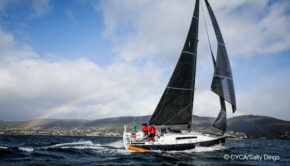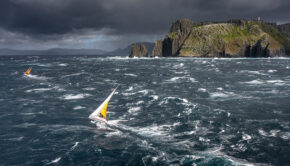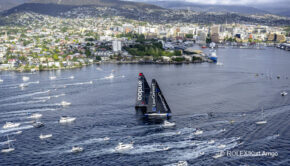Latest debacle for offshore racing
Published on January 3rd, 2022
The inclusion of safety requirements for offshore racing, while well-intended, create complexity and unintended consequences. European blogger Paulo Pernão of Interesting Sailboats provides his view of the latest debacle for distance events:
Celestial, Sam Haynes’s yacht (above photo), had the IRC time to win the 2021 Sydney Hobart Race, and was given as provisional winner, when it was protested by the boat that had the second-best time, Ichi Ban, Matt Allen’s yacht (and later also by the RC), for not being able to be reached on VHF, for a 90 minute period, during the race.
I thought the protest would be dismissed, as many boats suffered the same radio problems along a long stretch of shore that not always has good VHF coverage, and that situation had not given Celestial any advantage.
Sure, the contact with more than a dozen boats that had the same problem as Celestial, the accidental deployment of a Personal Locator Beacon, took less time but it was far from being immediate, as the rules optimistically demand (constant VHF watch), taking in average 15 minutes, but in some cases it took 25 minutes.
In the case of Celestial, the RC asked the nearest boat, Ichi Ban, without altering course,
to deploy flares to call the attention of Celestial, and that had a positive result being Ichi Ban contacted by Celestial by a handheld radio.
Being contacted by a portable VHF radio probably means that Celestial had some problem on the main radio or antenna that they were not aware.
But regarding the safety problem, that the RC makes a big fuss around, if Celestial did not change course or speed, if it did not deploy flares (and they would know that, being Ichi Ban close), neither attempted to call the RC with his satellite phone (that the RC knew they had), it was obvious with 99% certainty that it was a false alarm.
That does not dispense confirmation by radio contact but changes the degree of urgency, namely deploying an aircraft without that verification.
The race committee decided to consider the protest valid, give a big penalization to Celestial and a redress to Ichi Ban, transforming this one into the provisional leader. Later this decision was confirmed by the international jury.
The 3-minute redress to Ichi Ban, taking into consideration that it did not change course or speed, seems excessive to me.
Celestial’s 40 minute penalization for “breaking race communication rules”, namely a permanent VHF watch, seems arbitrary because many other boats were contacted and almost none replied in a manner compatible with a permanent VHF watch, being the average response time 15 minutes, but with some taking 25 minutes to reply.
If a penalization was given to Celestial, other boats should have been penalized too, even if in a lesser extent. However, Celestial was the only one penalized.
I would not have believed this was possible. How can Matt Allen feel any satisfaction with this “paper” victory and not be ashamed by the way it was managed?
After what happened at the 2021 Middle Sea Race, where a change of finish line dictated another winner, it is a case to wonder if World Sailing should not have a more pro-active role as to the last word in what regards protests, nominating the appeal jury for the main events.
For additional comments on Facebook, click here.









 We’ll keep your information safe.
We’ll keep your information safe.